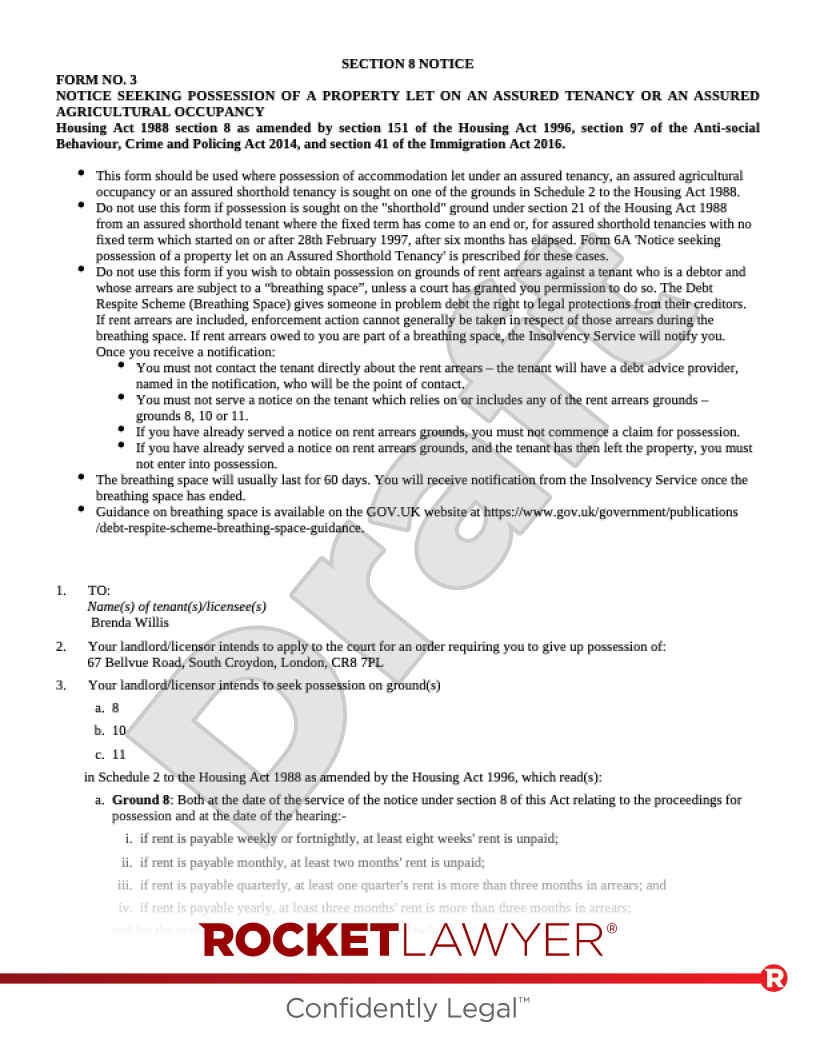Types of possession order
Standard possession
Landlords who are owed rent arrears can normally use the possession claim online service to repossess a property. The online service can be used for both England and Wales. It cannot be used where there has been trespass (squatting) on the property or if tenants have broken the terms of the lease. In cases where the online service cannot be used, landlords should fill in Form N5 and post this to the relevant local court (see GOV.UK for further information). The government website also contains Welsh versions of the relevant forms for use in Wales.
Accelerated possession
If rent arrears are not being claimed, and tenants have failed to leave at the end of a valid Section 21 notice period, landlords can apply for an accelerated possession order. Form N5B must be filled in and sent to the relevant local court (see GOV.UK for further information). Tenants will be given 14 days to challenge the application, following which a judge will either issue a possession order or decide to hold a court hearing.
Court orders
If the case goes to court, the judge can make the following decisions:
- dismiss the case
- adjourn the hearing
- outright possession order - tenants must vacate the property by the date given in the order (either 14 or 28 days after the court hearing). A warrant for possession may be issued by the court if they do not leave by this date.
- suspended order for possession - this allows the tenants to stay in the property subject to certain conditions (eg making regular payments)
- money order - tenants must make a certain payment, failing which bailiffs may be sent out
- possession orders with a money judgment - this is normally a set amount that must be paid by the tenants as part of a suspended order for possession (see GOV.UK for more information).
Possession hearings and court orders can be appealed if it can be shown that the judge made a mistake. If permission to appeal is granted, a court fee must normally be paid.
Using bailiffs
If tenants do not leave the property by the date provided in a possession order, a landlord can apply for a warrant of possession from the court. Form N325 must be submitted and fees paid. This form has a Welsh version for properties located in Wales. The warrant of possession (once granted), will provide a time and date of eviction at which point bailiffs can be sent to carry out the eviction. An alternative method is High Court enforcement.
For further information, read Bailiffs.
What is High Court enforcement?
Landlords can apply to transfer a possession order made by a county court to the High Court for enforcement by a High Court Enforcement Officer (HCEO). An enforcement is usually quicker however there is a process in which you will need to seek a 'certificate of judgment' from the County Court, which confirms the amount you are owed in your judgment.
If you want to do the paperwork yourself, you will need to request this certificate on Court Form N293a, which is a combined certificate of judgment to enforce the judgment by a Writ of Control.
See HCEOA for further information on High Court enforcement of possession orders.
How to delay an eviction
It is possible for tenants to delay an eviction by appealing to a judge to 'suspend a warrant for possession' where a new hearing will be held. The judge may decide to delay the eviction or allow tenants to remain in the property subject to making payments. Tenants looking to suspend a warrant for possession should submit Form N244 and ask for a hearing at short notice (before the eviction date). A court fee may need to be paid.
Tenants seeking to delay an eviction should Ask a lawyer for advice.
Illegal evictions and harassment
Tenants who have suffered harassment by their landlords in relation to an eviction - or where the landlord has not followed the correct procedures - may be able to claim damages. Harassment can include:
- withholding keys from tenants
- refusal of the landlord to carry out repairs to the property
- physical violence or threats
- orchestrated antisocial behaviour
- stopping utilities (eg cutting off electricity to the property)
- changing locks on the doors
Landlords may be found guilty of an illegal eviction if they do not provide sufficient notice, change the locks or evict tenants without a court order.




